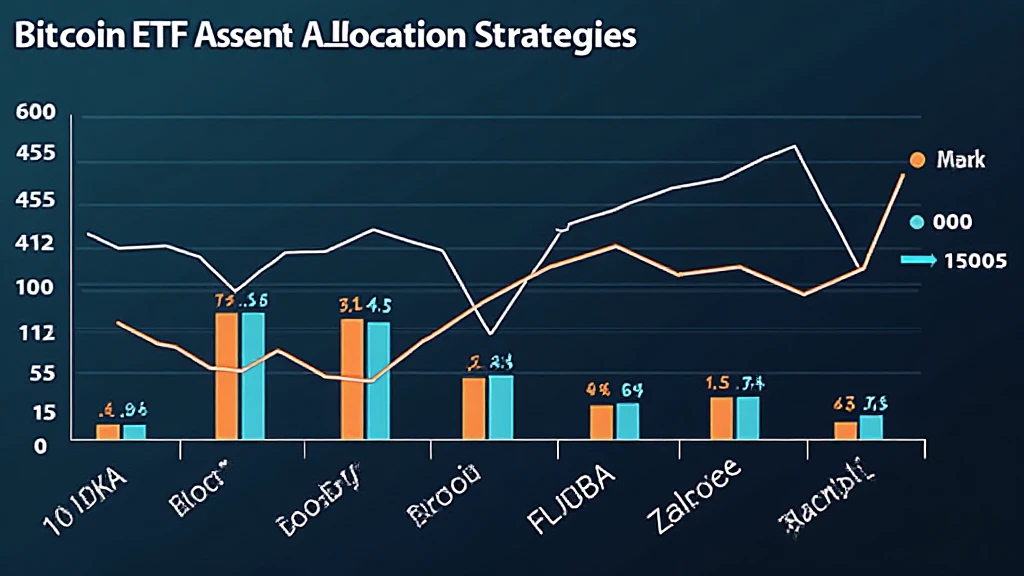
Bitcoin ETF Asset Allocation: Your Strategic Guide
With the significant rise of cryptocurrency in the global economy, many investors are considering asset allocation strategies that include Bitcoin Exchange-Traded Funds (ETFs). Reports indicate that the global ETF market surpassed $10 trillion in assets by the end of 2022, indicating a robust interest in varied asset classes, including cryptocurrencies. This article aims to shed light on Bitcoin ETF asset allocation and why it may be an essential component of your investment portfolio.
Understanding Bitcoin ETFs
Bitcoin ETFs are investment funds traded on traditional stock exchanges, designed to track the price of Bitcoin. Unlike direct ownership of Bitcoin, where you must manage a digital wallet and security, a Bitcoin ETF allows investors to gain exposure to Bitcoin without the need for a wallet. A vital aspect of understanding Bitcoin ETFs is their composition and the mechanism they employ to track Bitcoin prices.
- The fund buys and holds Bitcoin directly to mirror the asset’s price.
- Some ETFs utilize futures contracts to speculate on Bitcoin’s future price.
- Regulatory bodies, including the SEC, are increasingly scrutinizing these funds, protecting investors while promoting market integrity.
In the dynamic market of digital assets, Bitcoin ETFs simplify access for traditional investors.

Why Asset Allocation Matters
Asset allocation is the practice of distributing investments among various asset categories, such as stocks, bonds, and cryptocurrencies. For many investors, the importance of proper asset allocation lies in mitigating risks while maximizing returns. A well-structured allocation can yield benefits like:
- Diversification: Spreading investments across different asset classes to reduce risk.
- Risk Management: Balancing high-risk assets like Bitcoin with stable investments such as government bonds.
- Adjustment: A dynamic approach allows you to recalibrate based on market conditions.
According to the most recent data from Crypto Research Report, as of 2022, 47% of institutional investors are considering Bitcoin ETFs in their asset allocation strategies, reflecting its increasing acceptance.
Exploring the Bitcoin Allocation Strategy
When contemplating Bitcoin ETF asset allocation, several key factors should be evaluated:
- Investment Goals: Determine what you seek to achieve, such as wealth accumulation, retirement savings, or capital preservation.
- Time Horizon: Consider how long you plan to hold the assets and market volatility.
- Market Sentiment: Staying updated on market trends plays a crucial role in ensuring timely investment decisions.
The allocation to Bitcoin ETFs can range from 1% to 10% based on individual risk appetite and market conditions.
Local Insights: The Vietnamese Market
The interest in cryptocurrencies, particularly Bitcoin, has been on a steady rise in Vietnam. As reported, the number of crypto users in Vietnam has surged to over 7 million in recent years, helping the nation become one of the top 10 countries for cryptocurrency adoption globally. This trend increases the relevance of Bitcoin ETF asset allocation in the region.
Key Statistics
| Year | User Growth Rate | Market Participation |
|---|---|---|
| 2020 | 20% | 4.5 million users |
| 2021 | 30% | 6 million users |
| 2022 | 25% | 7 million users |
Incorporating Bitcoin ETFs into Vietnamese investors’ asset allocation could be a game changer for managing risks and optimizing returns in this rapidly growing market.
Real-World Examples
To understand how successful Bitcoin ETF asset allocation can be, let’s look at some real-world scenarios:
- Institutional Investments: Major players such as BlackRock are beginning to allocate a portion of their portfolios to Bitcoin ETFs, signifying confidence in crypto’s staying power.
- Retail Investors: Many retail investors have found success by allocating about 5% of their portfolios to Bitcoin ETFs, balancing their exposure to other assets.
As the ETF landscape evolves, keeping a close eye on how institutional and retail approaches can shape the investment environment is crucial.
Key Takeaways
The attraction of Bitcoin and cryptocurrency as a whole is difficult to ignore:
- Volatility: Bitcoin remains a volatile asset, but this volatility can lead to substantial profits when managed correctly.
- Hedging Opportunities: Bitcoin may serve as an effective hedge against inflation and market downturns.
- Regulatory Landscape: Understanding the regulatory implications is essential for all investors.
Following these considerations while planning your Bitcoin ETF asset allocation could pave the way for successful investment outcomes.
Conclusion
In conclusion, Bitcoin ETF asset allocation represents a significant opportunity for investors looking to diversify their portfolios into the cryptocurrency space. With careful consideration of investment goals, market conditions, and a growing understanding of the dynamic Vietnamese market, integrating Bitcoin ETFs could be a crucial decision going forward. Whether you are a seasoned investor or new to Bitcoin, taking deliberate steps towards understanding and strategizing your Bitcoin ETF allocations will contribute to a well-rounded portfolio.
When you are ready to explore further, don’t hesitate to consult reputable platforms like btcmajor, which provide insights and resources for crypto investments.
Author: Dr. Anna Nguyen, a renowned blockchain technology expert with numerous published papers on cryptocurrency regulation and digital asset management, and a recognized authority in auditing major crypto projects.







